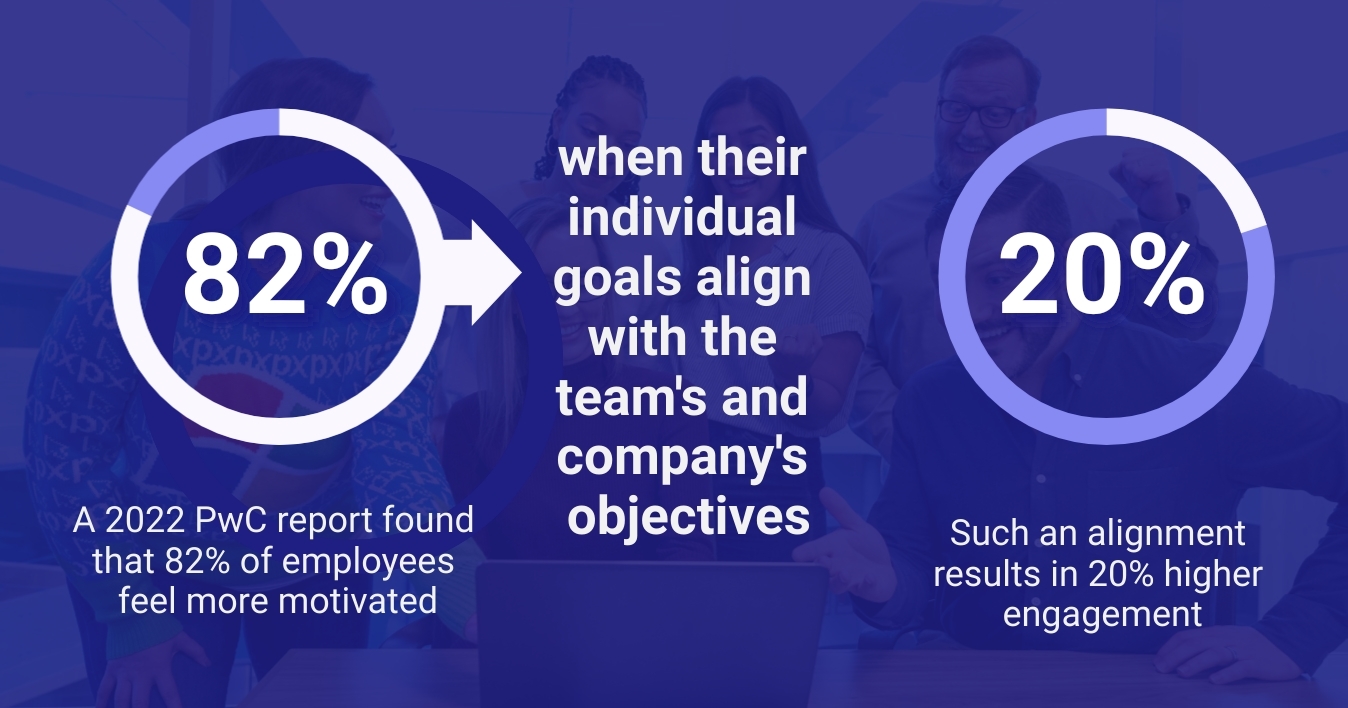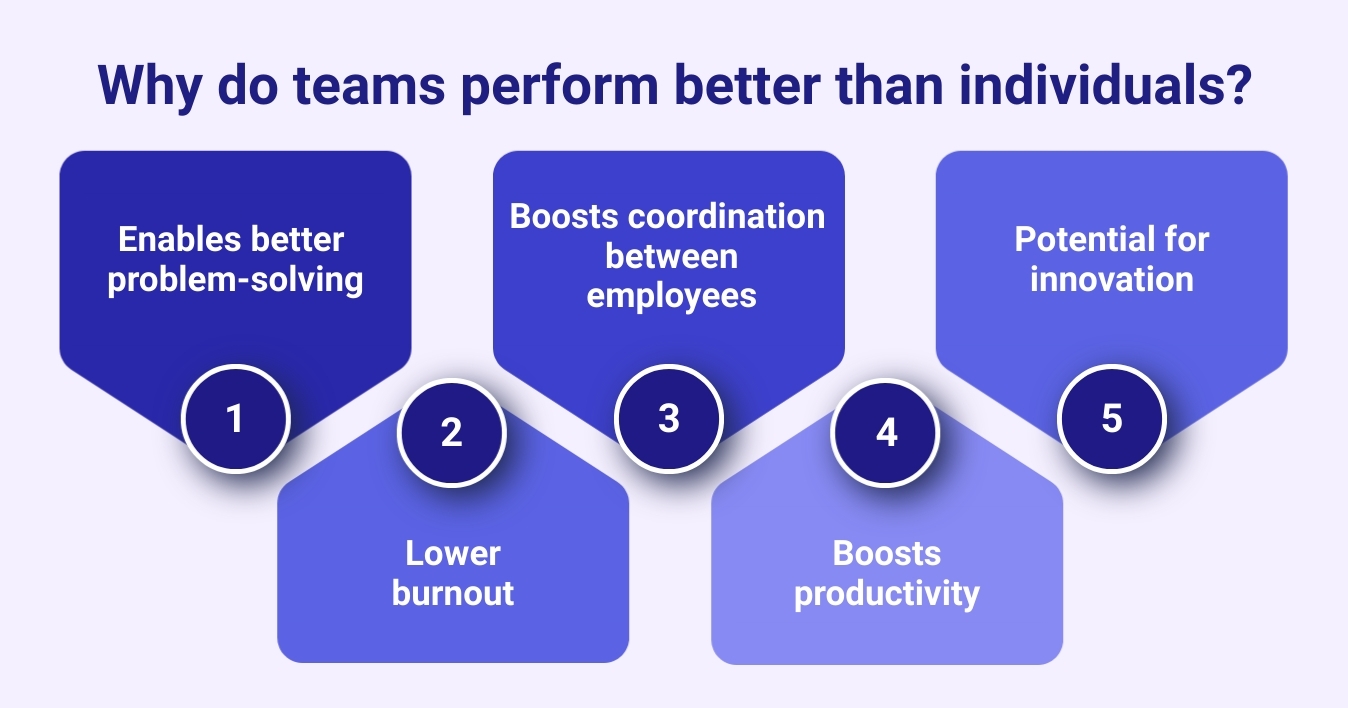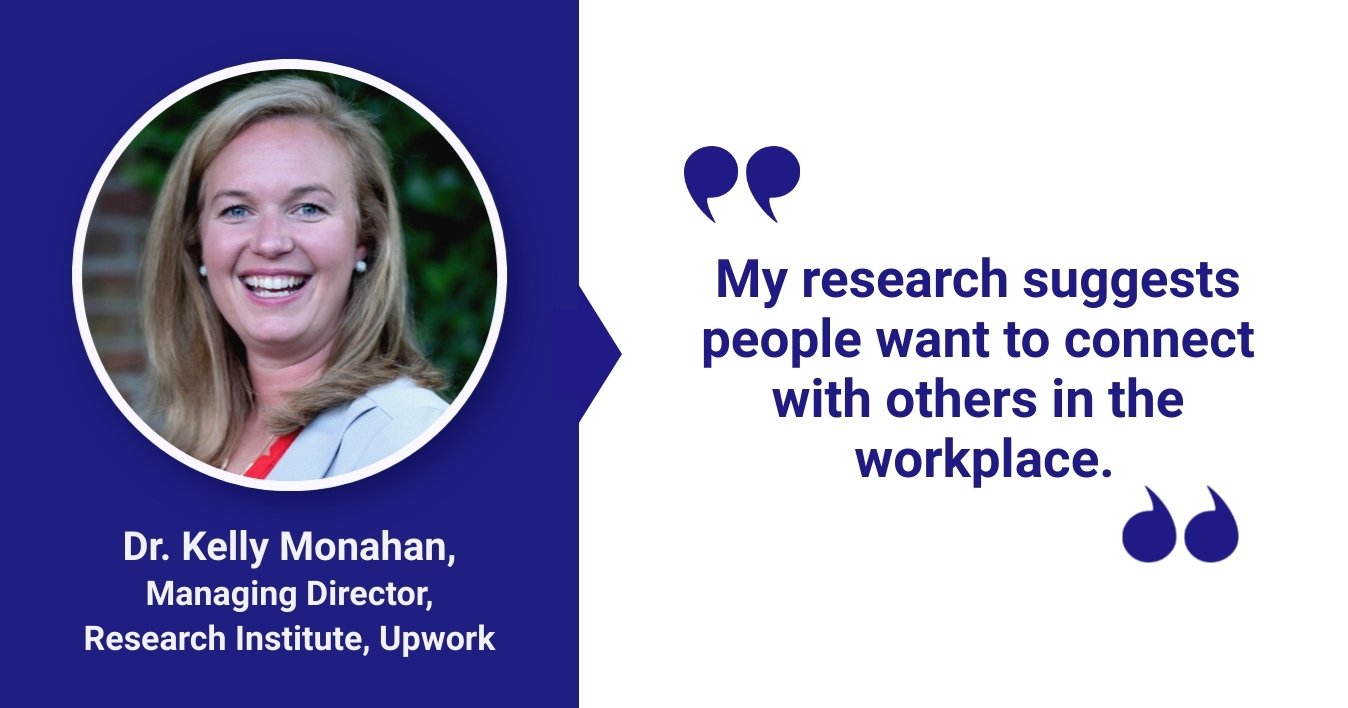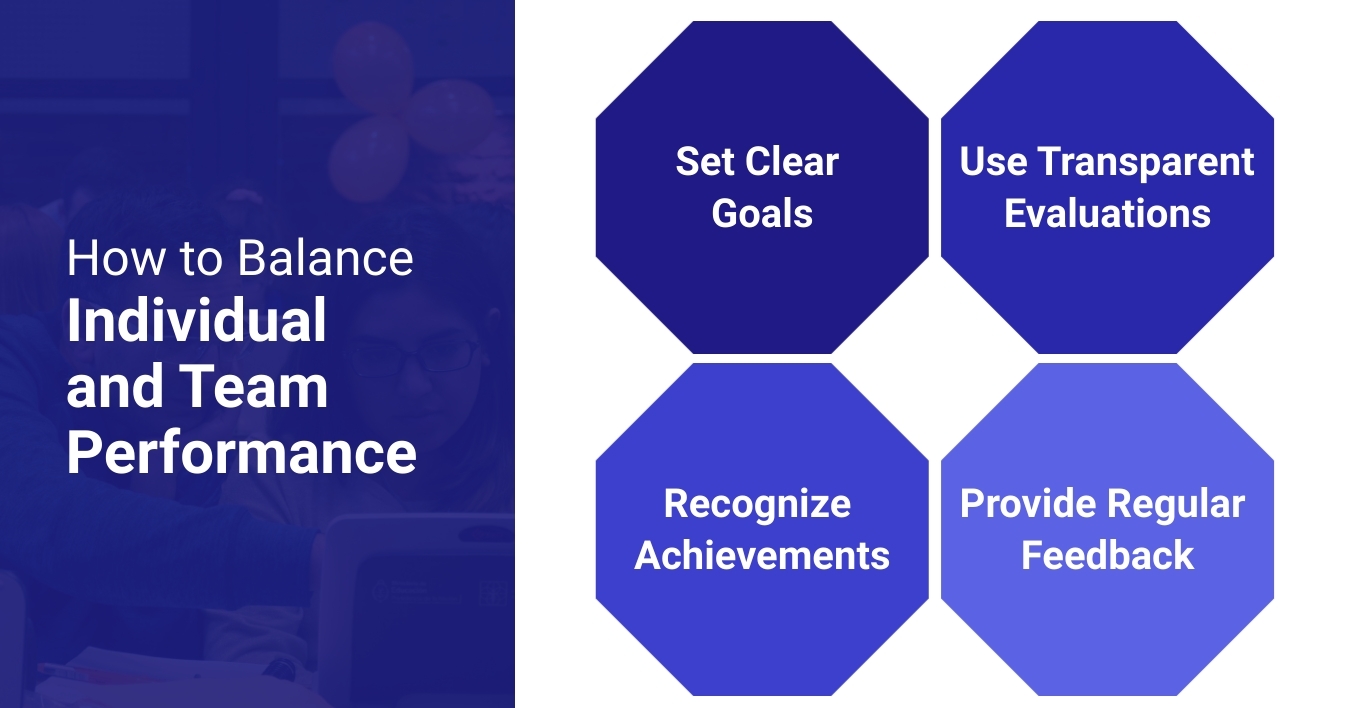Individual vs Team Performance in the #FutureofWork
Table of contents
- Why focus on team performance in today's workplaces?
- Why do teams perform better than individuals?
- How to build a team-centric performance culture in the workplace?
- Measuring the effectiveness of a team
- Advantages of measuring team performance
- Do you measure individual performance at all?
- How to balance individual and team performance
- FAQs
- Conclusion

When you glance at the headlines, it might seem like the future of work is all about technology. Artificial Intelligence, automation, and digital innovation are the main topics in news and boardrooms alike.
However, let's consider a more human approach to the future of work. By examining data on workers' attitudes, a new trend emerges – a future focused on relationships. While measuring performance is crucial, we must understand how to balance individual vs team performance.
Why focus on team performance in today's workplaces?
Building strong teams while aligning individual and team goals is more important today than ever. A 2022 PwC report found that 82% of employees feel more motivated when their individual goals align with the team's and company's objectives. A 2023 Microsoft study found a 54% increase in project success rates with strong communication and collaborative teamwork.

Therefore, organizational leaders must ensure a shift in perspective to focus on teams to prepare themselves for the future of work.
Yet many organizations continue to build their performance management strategies around individual performance, assuming people work in isolation and overestimating their tendency to act in self-interest.
This approach of rewarding individual high-performers overlooks teamwork and collaboration, creating competition.
A team-centric approach, on the other hand, can help teams co-create toward a shared objective, leading to more innovative and creative solutions. For example, a brainstorming session in a diverse team setting can help tackle complex issues more creatively, breaking down knowledge silos.
When leadership recognizes the contributions of team members and works towards changing workplace culture, teams thrive, and the whole organization benefits. Employees feel more engaged and motivated, creating a positive and supportive work environment, boosting productivity, and driving the company forward.
Why do teams perform better than individuals?
Emphasizing team performance is a smart strategy for any company, as teams often outperform individuals. From improved decision-making to lower burnout, here are some key reasons why being team-oriented is better:

Enables better problem-solving
When people work together, they combine their skills and perspectives. This leads to more effective problem-solving. Different viewpoints help identify issues and find solutions faster.
Boosts coordination between employees
Teamwork improves coordination. Employees learn to communicate and collaborate, which makes projects run smoothly and helps avoid misunderstandings.
Potential for innovation
Teams foster innovation. Brainstorming in a group sparks creative ideas, and diverse experiences and skills lead to unique solutions.
Lower burnout
Working in a team can reduce burnout. Sharing responsibilities lightens the load, and team members can support each other, making the work environment less stressful.
Boosts productivity
Teams can be more productive than individuals. They divide tasks based on strengths. This efficient approach leads to faster and better results.
How to build a team-centric performance culture in the workplace?
For too long, organizations and employees have intentionally removed relationships from workplaces. But humans cannot survive, let alone thrive, without social connections. Our connections with others influence every aspect of our lives, including work performance.
"My research suggests people want to connect with others in the workplace," says Dr. Kelly Monahan, who was then a researcher on the future of work at Deloitte.
"When asked what would make them go the extra mile, the answer was around seeing the impact their work would have on others. When considering what would drive higher performance, employees responded with answers such as trust and better treatment of each other in the workplace. Nearly all answers related to work performance centered on their ability to work well with those around them."

Unlocking your team's full potential in the #FutureofWork will depend not on the latest technology or hiring the right people but on relationships, connections, and collaborations in the workplace.
Shifting from an individual-centric to a team-centric performance management system may seem challenging. But you can build a team-centric performance culture and foster collaboration, innovation, and overall success by following these steps:
Establish clear team goals and objectives
First, set clear goals for your teams. When everyone understands what the team aims to achieve, they work together more effectively.
Ensure individual goals align with team objectives
Make sure individual goals support team objectives. This alignment ensures that personal achievements contribute to the team's success.
Encourage collaboration and teamwork
Promote collaboration and teamwork. Create an environment where employees feel comfortable sharing ideas and working together.
Recognize and reward team performance
Recognition boosts performance. Celebrate team achievements to motivate members and reinforce the importance of working together.
Team building activities
Organize team-building activities at work. These activities strengthen bonds and improve communication among team members.
Hire and train for relational skills
To develop a strong workforce for the future, prioritize interpersonal skills like empathy and respect alongside tech skills. Hire and train employees to support each other, and team performance will improve.
Replace individual silo functions with interconnected networks of teams
Future work will rely on cross-functional teams to tackle major challenges. Breaking down silos and creating interconnected teams encourages knowledge sharing and boosts efficiency.
Building a team is one of the many complex functions business leaders and managers deal with. But a seamless team operation can definitely be built with human connections. Build a connected culture using these four strategies.
Measuring the effectiveness of a team
To truly measure team performance, you need to look beyond just output and results. Here are some key metrics to help you better understand the team's performance and build a high-performance team culture:
Productivity
Measure how much work your team completes in a given time. This shows their efficiency and effectiveness.
Adaptability
Assess how well your team adapts to changes. This includes their ability to handle new challenges and shift priorities.
Work efficiency
Evaluate how effectively your team uses resources. This includes time management and minimizing waste.
Teamwork
Observe how team members collaborate. Strong teamwork is crucial for achieving goals and solving problems.
Employee satisfaction
Gauge how happy your team members are. High satisfaction often leads to better performance and lower turnover.
Absenteeism and overtime
Track attendance and overtime hours. High absenteeism or overtime can indicate burnout or disengagement.
Communication frequency
Monitor how often team members communicate. Frequent, clear communication is key to effective teamwork.
Knowledge-sharing initiatives
Look at how often team members share information and skills. This fosters growth and improves overall team performance.
A balanced approach to measuring a team's effectiveness is crucial. Be sure to combine quantitative data, like project completion rates and productivity metrics, with qualitative data, like team member feedback and employee satisfaction. This will give you a clear and complete picture of your team's performance and effectiveness.
Technology can help collect and analyze these metrics. While individual performance is common to most performance management systems, tools like project management software and employee surveys make it easier to gather and interpret data.
Advantages of measuring team performance
Measuring team performance goes beyond just adding up individual metrics. It helps create a more cohesive and efficient team environment. Here are some key advantages:
- Improved team dynamics: Enhances interactions and relationships within the team
- Accountability: Encourages each member to contribute their best
- Alignment with organizational goals: Ensures team efforts support overall objectives and key results (OKRs)
- Promote collaboration and ownership: Fosters a culture of working together towards common goals
- Identify areas for improvement: Helps pinpoint and address issues early on for continuous improvement and growth
- Increased innovation: Encourages creative problem-solving by leveraging diverse skills and perspectives
- Better resource allocation: Helps allocate resources more efficiently based on team needs and performance
- Focus on employee satisfaction: Leads to a more supportive and engaging work environment
Do you measure individual performance at all?
Collaboration and interconnected teams are essential in modern workplaces. The evolving work environment relies on teamwork and the collective intelligence of an interconnected network of teams.
However, measuring individual performance is still important within this context. Each employee's contributions are vital to the team's success, and recognizing individual efforts ensures everyone stays motivated and accountable.
How does individual performance affect team performance?
Individual performance directly impacts team success. When each member excels, their contributions boost the team's overall performance. Individual goals aligned with team objectives ensure everyone works towards the same targets.
A balanced approach is crucial. Recognizing individual achievements is one of the effective ways to motivate employees while fostering accountability. At the same time, focusing on team performance encourages collaboration and unity.
This balance creates a strong, high-performing team and a cohesive work environment where both individual and collective efforts are valued.
How to balance individual and team performance
Balancing individual and team performance is crucial for success. This starts with aligning individual and team goals, which results in 20% higher engagement and improved performance through shared focus, according to a 2023 WorkBoard study.
The outcome here is higher overall performance, as everyone's efforts contribute to team success. However, without a proper cultural transition from individual to team performance, balancing the two could be challenging.
For example, team accomplishments might overshadow individual contributions, someone might "free-ride" the team's success, or there may be communication gaps affecting team and individual results.
Here are some steps you can take to overcome these challenges and effectively balance individual and team performance to ensure overall success:

Clearly defined individual and team goals
Set clear goals for both individuals and teams. This ensures everyone knows their role and how they contribute to the bigger picture.
Transparent performance evaluation processes
Use transparent performance evaluation processes. This helps assess both individual and team efforts fairly, reducing the risk of free-riding.
Recognition for both individual and team achievements
Recognize both individual and team achievements. Celebrate successes at both levels to keep everyone motivated and appreciated.
Provide regular feedback to individuals and teams
Provide regular feedback to individuals and teams. Giving effective feedback helps maintain alignment with goals and addresses issues promptly.
FAQs
What is the difference between individual performance and team performance?
Individual performance focuses on a single person's contributions and achievements. Team performance measures how well a group works together to achieve common goals.
How does individual performance affect team performance?
Individual performance impacts team success. When each member excels, the team benefits. Aligned individual goals ensure everyone works towards the same objectives.
How do you evaluate individual and team performance?
You can evaluate individual performance by assessing personal goals and contributions. To evaluate team performance, you need to measure collaboration, goal achievement, and overall group effectiveness. A balanced approach, using quantitative and qualitative data, is necessary in both cases.
Why is team performance more important than individual performance?
Team performance is more important because it reflects collective success. A strong team can solve complex problems, innovate, and achieve more than individuals working alone.
How does team performance management differ from individual performance management?
Team performance management focuses on collaboration, shared goals, and group achievements. Individual performance management emphasizes personal goals, contributions, and development. Both require different evaluation and feedback processes.
Conclusion
Balancing individual vs team performance is key to thriving in the future of work. While technology is crucial, human relationships and collaboration drive true success. Innovation, learning, and growth now happen at the team level within organizations.
Focusing on human and relational aspects will make your organization a desirable place to work. Emphasizing team performance over individual tasks prepares you for the future and nurtures a thriving, innovative workplace. Embrace a team-centric approach to unlock your organization’s full potential.
About the author
Ryan Stoltz
Ryan is a search marketing manager and content strategist at Workhuman where he writes on the next evolution of the workplace. Outside of the workplace, he's a diehard 49ers fan, comedy junkie, and has trouble avoiding sweets on a nightly basis.